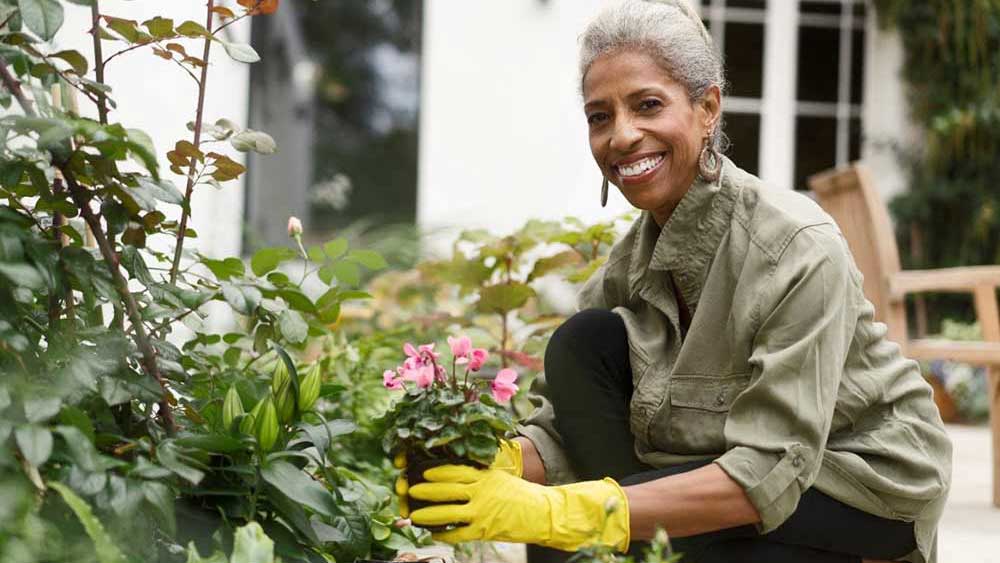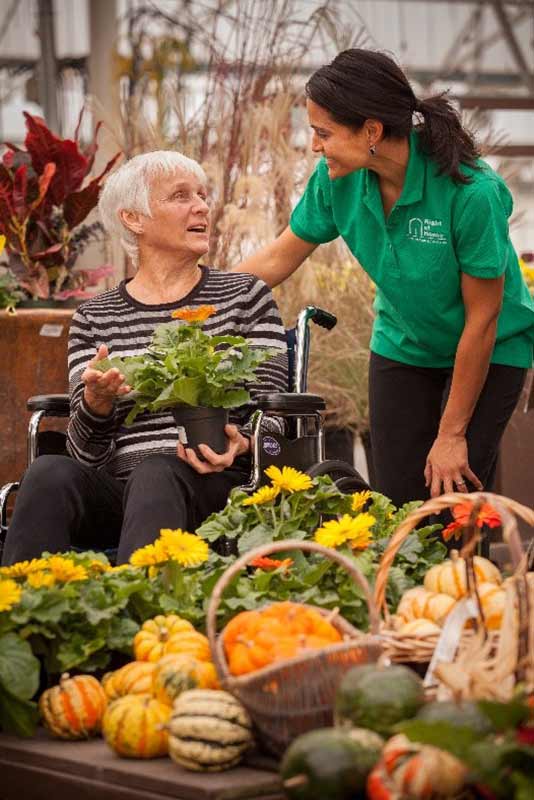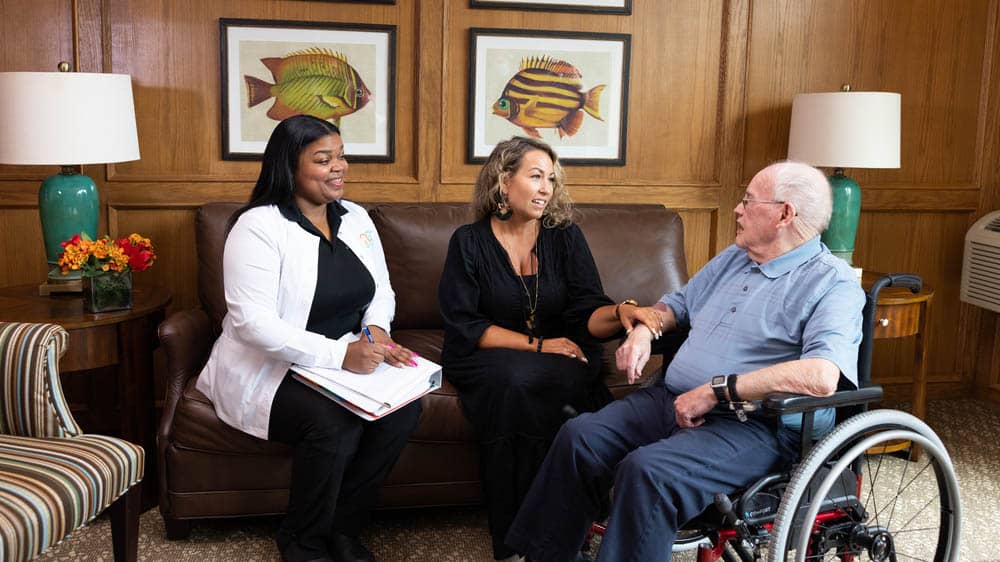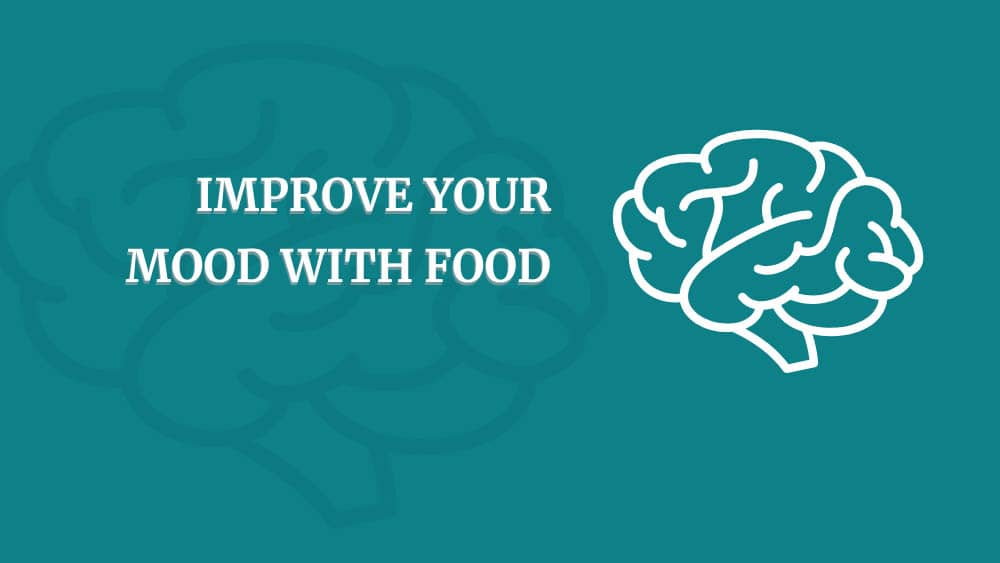

Eight Ways Gardening Helps Aging Adults
As the pandemic lockdown began, the Associated Press reported on a gardening boom in the U.S. People weren’t only stocking up on toilet paper and hand sanitizer! Some were emptying the garden store shelves of seeds, compost and bedding plants. This isn’t surprising, historians say. Often during times of crisis, people have an impulse to go “back to the land”—even if it’s just their backyard or a container on the balcony.
Even before the pandemic, a crop of recent research studies showed the healthy aging benefits of gardening. We can harvest these benefits:
1. A good workout. A study published by the American Society for Horticultural Science showed that older adults who took up gardening increased their daily activity, aerobic endurance and hand dexterity, and even reduced their waist measurement. We get plenty of exercise as we prepare the soil, plant, water, weed … and, of course, harvest those flowers, veggies and fruits. Harvard Medical School experts say gardening can use as many calories per hour as walking or water aerobics, and provides stretching and muscle toning.
2. An emotional boost. In May 2020, experts from Princeton University described the mood boost people get from various activities, and found that gardening offers a benefit similar to walking, biking or dining out. They found that while working with others in a community garden lifted the spirits, people who gardened alone also experienced greater happiness and contentment—a real bonus in these days of social distancing.
3. Improved nutrition. Growing fruits and veggies is great motivation to consume more healthy, fresh food in place of processed foods. Studies also show that seniors on a fixed income and people experiencing economic insecurity due to the pandemic were able to supplement their food budget with what they grew.
4. An enhanced immune system. A February 2021 study published in the Journals of Gerontology found that people who garden may have a lower level of “immunosenescence”—the age-related decline in effectiveness of the immune system. They also have lower levels of “inflammaging”—low-grade inflammation that is common among older adults that raises the risk of infection, cancer and inflammatory diseases.
5. More time outdoors. Many studies show the benefits of spending time in fresh air and greenery. Sometimes it might seem like too much effort to go to the park, or too boring just to sit in the yard. But researchers from the University of Lincoln in the U.K. found that people who have a garden tend to spend more time outdoors. And while we should use sunscreen to protect our skin from UV rays, some exposure to sunlight is important to help seniors get enough vitamin D.
6. Mindful moments. We read a lot these days about “mindfulness.” The University of Lincoln team found that gardens can be “personal sanctuaries,” where older adults might reminisce and let their minds wander. “Time can often feel like it runs away with you when you’re gardening,” they said. “But ‘nature’s time’ isn’t just a figment of our imagination. Research has shown that gardening can actually alter your perception of time, with gardeners reporting that it can feel like time is standing still when they’re in the garden. So losing yourself to a few hours on nature’s clock, without worrying about everyday responsibilities, can be a great way to take a breath and focus the mind.”
7. Self-esteem and a sense of purpose. The University of Lincoln researchers also noted, “Every garden, big or small, allotment or rolling meadow, is an opportunity to put your own stamp on a space.” How meaningful it is to design a garden, to grow and nurture the plants, and then to arrange a bouquet, make a salad with homegrown produce, and maybe share the surplus with a food bank or friends. Even during the pandemic, older adults are sitting on their front porches, receiving compliments on their begonias from properly distanced passersby. Experienced gardeners are sharing their wisdom with newbies in online garden clubs. One study even showed that gardeners have a better body image!
8. Promoting brain health. All of the benefits above play a part in another remarkable benefit of gardening: It has been found to reduce the risk of dementia by lowering the risk of health conditions that harm the brain, such as heart disease, high blood pressure, diabetes and depression. We also receive beneficial mental stimulation from planning our garden, selecting plants, and deciding just the right moment to harvest. “As the old saying goes, every day is a school day and gardening is no different,” said the University of Lincoln experts. “As with any other hobby, it’s something that is honed over many years, and for a lot of people, gardening is about trying new things and experimenting until they get it right.” That’s as good a mental workout as any puzzle or brain game.
So this year, give your green thumb a chance!
If you haven’t gardened in a while, or you’re new at it, this is a great time to give it a try. Even if you don’t have a yard, you can create a container garden or a few pots of herbs. “Some vegetables like carrots, lettuce, kale and hot peppers don’t require much space,” said Dr. Philip Smith, a lifelong gardener and researcher on obesity for the National Institutes of Health. “These can be grown in pots or small gardens. You can also try growing hanger tomatoes, which can be suspended from your deck or porch.”
If your family uses in-home care services to support the well-being of a loved one, gardening can be a terrific activity for your loved one and the caregiver to do together. The caregiver can pick up plants at the garden center—or, depending on your loved one’s vaccine status and doctor’s advice, your loved one might come along to browse for that perfect tomato plant. Ask if your garden store offers curbside pickup or shopping by appointment, and if they’re taking precautions to keep shoppers safe.

Your loved one can plan the garden; the caregiver can fill in for the heavy lifting (literally—those bags of compost are heavy!). Your loved one can post photos of their progress on social media or have a virtual garden party with family. And last but not least, the caregiver can help create gorgeous cut flower bouquets, or delicious meals planned around fresh-harvested veggies.







